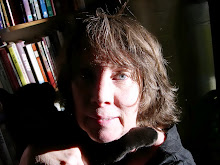Now They Will See Me
I’ve been thinking lately of
Birdsong. It has been 10 years or so since I last saw her, wrapped in finery
from the free box, dangling single brass earrings in her hair—a star, a
crescent, a glittering butterfly, telling me drunkenly “Now they will see me in
my true beauty!”
She annoyed me greatly on the
days she was drunk or in the florid upswings of her bipolar illness, loud and
flamboyant and demanding. But she knew a bit about books and a lot about
plants. One afternoon in a calm moment she described the beautiful glassed in
porch in which she once grew her begonias and African violets and ferns, in the
days when her girls were young and still with her, before the bottom fell out
of her universe.
We shared a lot of
similarities. I often thought that with just a small twist of fate she could
have been the town booklady & I the desperate, drunken, sometimes charming
survivor.
I particularly remember the
time at the start of bombing…somewhere, Iraq, Afghanistan—when I stood alone in
my weekly Women in Black vigil down the street a bit from the bookshop and was
joined by Birdsong and Bobby and Cricket.
Bobby fixed me with his blue
eyes and said “I did terrible things in Nam, so if you are a peace lady you got
to hate me” And I said “I’m so sorry, so very sorry you went through that. I
don’t want anyone else to go through that, not ever”. He asked if sometimes he
could come and stand beside me. I said yes.
Cricket was just tagging
along with his Birdsong, but they wanted to know if they could also stand with
me. Sure, I said. You might have noticed I wasn’t exactly a very traditional
Woman in Black, except for the black I wore. I’d answer questions. I’d talk.
I’d even laugh, and I wasn’t going to turn away anyone, man, woman, child or dog,
who wanted to stand beside me. So Birdsong and Bobby and Cricket did,
especially on the days when my stalwart associates Sara and Michelle weren’t
able to be there and I would have been left by myself.
Bobby died of hard drinking
and pneumonia and probably the spinal problem he brought back from Vietnam.
Cricket got bit in a fight and the wound turned green and oozy and he died of
gangrene in a hospital up north. I remember thinking, as I wept at the news,
that access to soap and hot water might have healed him. Birdsong by then had
flown somewhere else. Maybe to find her daughters in the Midwest, where that
glassed in porch was, where there were memories of begonias and ferns. I don’t
know.
But I remember particularly
that first time she joined me, because she sat on the side walk, smelling a bit
of cheap booze, and glared at me. “D’ya think I’m homeless?”
I really wasn’t sure what to
say to her, knowing as I did that she was sleeping in a torn tent on the edge
of town.
“I’m not” she said. “People
say I am and they tell me to move on and they look down on me, but I have a
home”.
She waved at the darkening
sky. “There, see that—that’s my roof”
I smiled. “Well, true enough,
that’s the roof for us all”
She said “and this is my
home, right here” and she pounded the cement sidewalk with her open hand. “I’m
home, ain’t no one got the right to tell me to move on”
So, as I said, I don’t know
if she’s still living, if the sky remains her true roof, if she found peace or
calm or anything. But I remember her in her finery, and how she said she was a
queen, an empress, and how when she walked down the streets of this town,
someday people would know her in her glory.
And how astonished they would
be, to see her shining there, so beautiful, so radiant, so much in her own true
home in this aching, fragile world.
Labels: Birdsong, homeless, love, women in black



